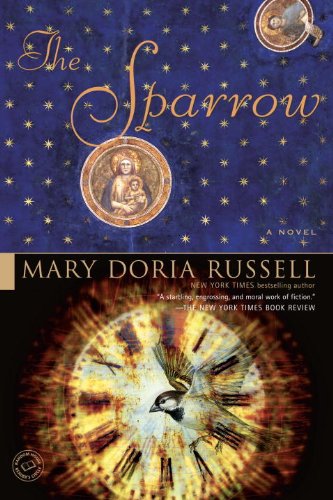
![]() The Sparrow by Mary Doria Russell
The Sparrow by Mary Doria Russell
Not one sparrow can fall to the ground without your Father knowing it. ~Matthew 10:29
I thoroughly enjoyed this expansive story of space travel and first contact. The Sparrow (1996), a multiple award-winning novel from Mary Doria Russell and the first book in THE SPARROW duology, is wonderfully deep in its exploration of culture clash and how individual experiences, both spiritual and physical, shape those interactions. Russell is at her best in bringing her characters to life and deftly creating three dimensional imagery that are at once understandable, real, and relatable.
The story revolves around a Jesuit priest, Sandoz, who returns from a Mission to a far planet, alone, barely alive, and deeply changed from the man that left. Russell bounces back and forth between the ‘current’ Sandoz, and the back-story leading up to, and including his journey. The novel starts a bit like Carl Sagan’s novel Contact… SETI-based scientists are listening for extraterrestrial noise atop the Arecibo Observatory in Puerto Rico. They hear music and are drawn to a planet in the vicinity of Alpha Centauri. Sandoz is just one member of the mission sent to investigate. He’s the only member of the crew to return. Due to the nuances of long-distance space travel, Sandoz returns to find none of his friends and family still alive.
Russell crafts the narration of the story, and through her characters, a wealth of scientific, religious and philosophical pondering, by flashing back to the journey and the time spent on the planet, and returning focus to ‘present day’ Earth.
The historic role Jesuits have played in exploration is explained in Russell’s prologue:
During what Europeans were pleased to call the Age of Discovery, Jesuit priests were never more than a year or two behind the men who made initial contact with previously unknown peoples; indeed, Jesuits were often the vanguard of exploration…
The Jesuit scientists went to learn, not to proselytize. They went so that they might come to know and love God’s other children. They went for the reason Jesuits have always gone to the farthest frontiers of human exploration. They went ad ‘majorem Dei gloriam’: for the greater glory of God. They meant no harm.
And this sets the framework for a journey of exploration that’s at once very modern and futuristic, but taps into the same issues that the European explorers faced when traveling to the new world.
The Sparrow is deeply religious… but not lecturing, or judgmental, or even espousing a particular point of view. But in the exploration of this new world, and the exploration of Sandoz, Russell delves deeply into how religion shapes people and their actions.
This is a wonderfully crafted award-winning book that combines superlative story telling and deep meaning. I highly recommend it.




I’m embarrassed to say that this has been on my TBR list for far too long. Thank you for reminding me why I want to read it!
I really enjoyed the book, have you read the next book?
Ctgt – no, but I have it on my wishlist. Have you?
This and it’s sequel “Children of God” have long been my favorite books ever. I’ve read both scores of times and my dog is named Sofia.
Nope, I have not read it yet….too many books not enough time.